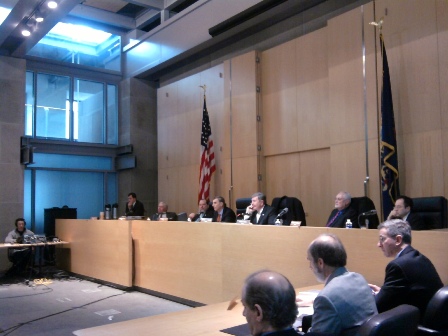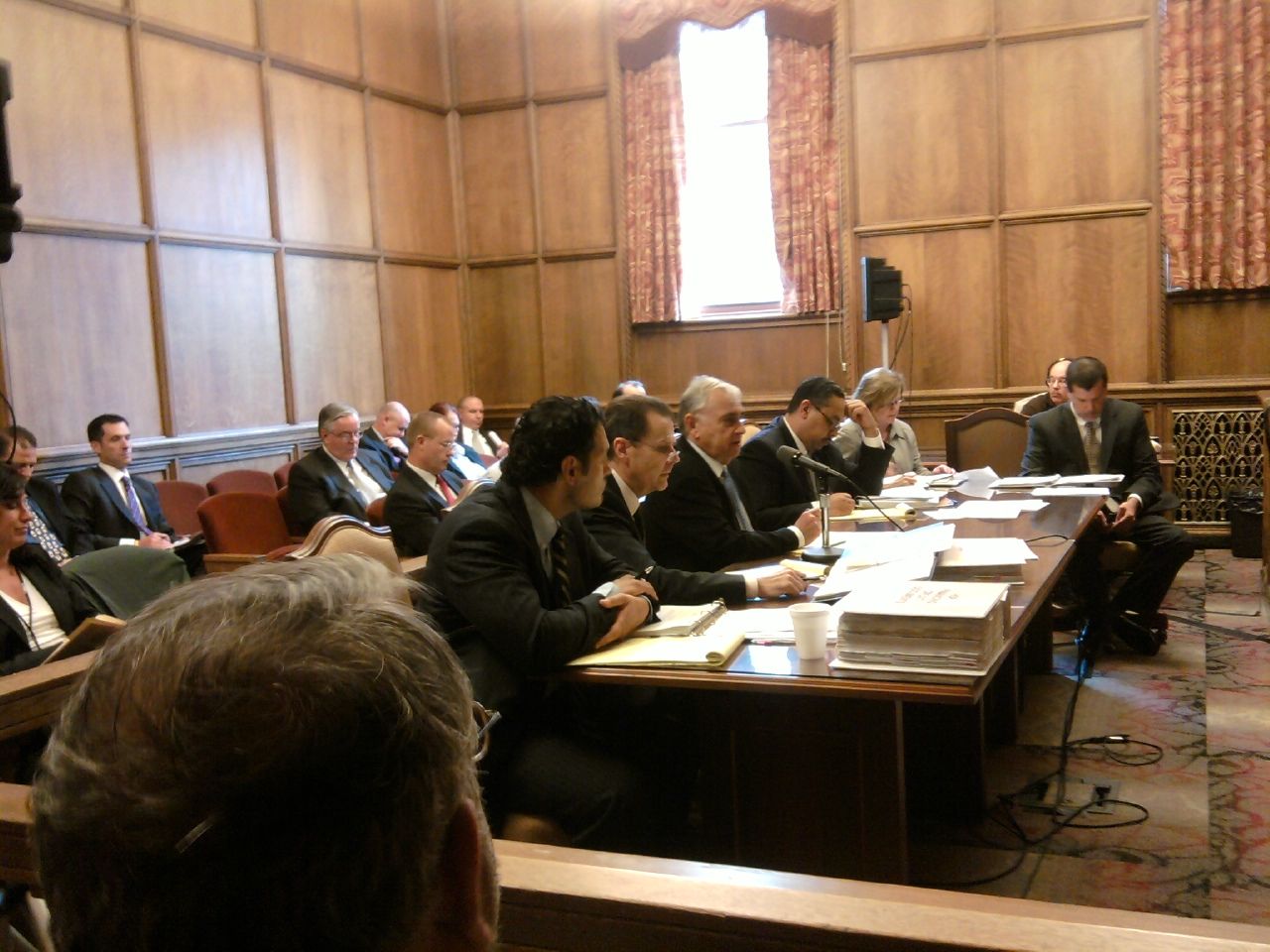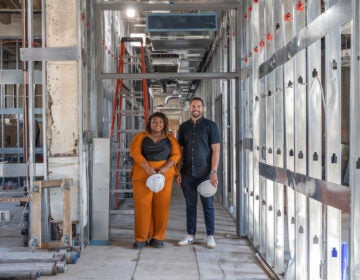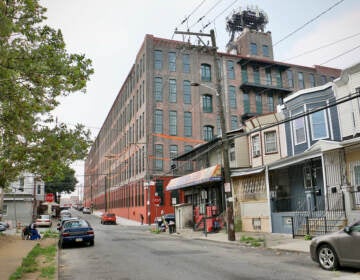SugarHouse gets PGCB OK on loan

Sept. 16
By Kellie Patrick Gates
For PlanPhilly
The Pennsylvania Gaming Control Board Wednesday approved SugarHouse Casino’s plan to borrow $220 million from a cadre of 20 lenders.
The ruling includes several caveats, however, including this: The casino’s owners cannot receive any of the profits from their venture – except to pay taxes – until after Phase I is finished. That means the completion of the interim casino, the parking garage, and the first phase build-out of the casino, into which the interim facility will be absorbed.
The PGCB also ruled that the documents outlining the details of the deal could be kept confidential – over the objections of two local legislatures who suspect there’s more in those documents than just numbers.
https://www.youtube.com/watch?v=tL3nQ7g04tU
SugarHouse chief investor Neil Bluhm told the Board that with this ruling, he hoped to sign loan documents within the next day or so, and his company would begin hiring construction workers soon after. SugarHouse has already ordered the steel needed for the building, he said.
“If you approve it, we can get rolling and meet our schedule,” he said.
Bluhm said time was of the essence, because with the financial market like it is, he couldn’t be sure SugarHouse’s financing offer would still be in place even days from now.
https://www.youtube.com/watch?v=UYebgbY1o6k
Board Chairman Gregory Fajt said he knows market conditions are unprecedented, which is why he called the special meeting of the board to get a decision quickly.
Just before the board went into executive session to discuss its decision, Commissioner Kenneth T. McCabe praised Bluhm for the work he has done in Pittsburgh, where he is an investor in another casino. McCabe said if SugarHouse turned out as well, Bluhm would be giving Philadelphians something great.
https://www.youtube.com/watch?v=ZmT1CY2DQHo
McCabe and the other commissioners know that there has been significant opposition to SugarHouse and the other casino with a license to operate in Philadelphia, Foxwoods. In light of the Board’s ruling, Casino-Free Philadelphia issued a statement saying it will try to stop construction on the SugarHouse site. “We’re committed to stopping casinos in Philadelphia from opening and shutting them down if they do,” said Jethro Heiko, a founder of Casino-Free, in the emailed statement.
Some Philadelphians do see things more like McCabe, however. At its monthly meeting earlier this week, pro-casino community group Fishtown Action celebrated the news that support piles would soon be driven at the site.
https://www.youtube.com/watch?v=A_1_G5tcmy0
Bluhm told the Gaming Control Board Wednesday that getting the money was “a very arduous task.” It would have been easy three years ago, he said. But in this economic climate, none of the banks he usually does business with would lend the
money to build a casino.
“We went to the syndicated loan market,” he said, adding that those funds and investors are looking for higher yields than typical banks, so the interst rate is higher.
Credit Suisse and Jeffries Finance are the two main lenders, Sugarhouse attorney Michael Sklar said after the hearing. He would not identify the others.
https://www.youtube.com/watch?v=mdpqyICO21Y
Sklar said that SugarHouse requested that the financial documents be kept confidential because lenders don’t want other potential borrowers to know what terms they are giving.
An attorney representing State Rep. Michael O’Brien and Sen. Larry Farnese wrote a letter to Fajt Tuesday, which was added to the record of the hearing, pressing the board not to grant confidentiality “in the interests of transparency.”
https://www.youtube.com/watch?v=zvKoYXIyQfQ
On Monday, the Office of Enforcement Counsel filed a response to SugarHouse’s petition, and those comments show the casino’s filings contain more than financial information. “Although the public documents speak of the need to maintain the confidentiality of financial information, the OEC’s recent filing reveals that HSP (SugarHouse) also seeks to modify the conditions previously imposed by the Board in granting HSP’s Petition for an Extension of Time and Modified Plan of Development,” wrote Mary E. Reeves, an attorney with Donna Adelsberger & Associates. This includes SugarHouse’s intent to buy Pier 49 and Pier 50 and a request for “a reduction in the number of slot machines from 1,700 to 1,600.”
When the Board asked about the slot machine reduction during the hearing, Bluhm said he still intends to have roughly 1,700, but there may be a slight reduction in the number to accommodate slots that simulate roulette and black jack. They take up more room, he said, but they also generate more revenue.
https://www.youtube.com/watch?v=XyCUQTghGnw
Bluhm said SugarHouse may also want to reduce the number of slot machines to make room for table games, as current discussion in the legislature indicates they may become legal in Pennsylvania sooner than expected. In that case, however, a plan would be submitted to the Gaming Control Board for approval, he said.
In her letter, Reeves suggested that if the board was not comfortable making the financial documents available for public scrutiny in their entirety, it could do so with proprietary business information redacted.
But once the board was assured that all documents were available, questions regarding confidentiality ceased.
There was a lot of talk about parking facilities during the proceedings.
SugarHouse’s current plans call for building an interim casino to get 1,700 slots up and running by next summer. This building will be surrounded by surface parking lots until a parking garage is built. This is what PennPraxis said about waterfront garages on Page 53 of its Civic Vision for the Central Delaware: If adjacent properties are acquired by the casinos, development standards should allow for the creation of city streets separating casinos from new development to allow for access to the river. The casinos should also work to avoid the construction of additional large-scale structures dominated by inactive parking structures and blank-walled buildings.

Some of the planned surface parking will be on Pier 49 and Pier 50. Sugarhouse had planned to rent this space, but Bluhm said Wednesday the new plan is to buy them for $12 million. This will give the casino another five acres of waterfront space, he said.
Bluhm assured the Board that if the casino ever intends to do anything more than use the space for parking, it will bring plans to the Board for its approval. He said SugarHouse does not need permits from the U.S. Army Corps of Engineers to demolish the existing warehouse or make surface parking, but likely would need permits to build any structure.
Paul Boni, attorney for Casino-Free Philadephia, said he is not so sure that a parking lot would not require Army Corps approval. And he believes that SugarHouse would need the state legislature to grant them a riparian rights permit for even a surface lot if any of it stretches onto the swath of state-owned lands along the Delaware. “It’s something I will be looking into,” he said in a phone interview.
Cyrus Pitre, of the PGCB’s Office of Enforcement Council, was very concerned about the parking garage. He wanted assurances that it and the promised amenities it will also house, would be built. In fact, in a response to SugarHouse’s petition, which was filed Monday, OEC said casino investors should not receive any profits from the operation or any oversight fees until the garage was built.
Pitre relaxed that stance to allow oversight fees – which Bluhm said were needed to pay employees – after hearing Wednesday’s testimony.
“I wanted to be sure they had a Plan B,” Pitre said after the hearing.
Bluhm told the board that the casino has a credit agreement with its lenders that requires SugarHouse to wait at least six months after the casino opens to start work on the $73-million parking garage. During that time, profits must be kept in an account. Garage construction can begin once that account hits half the cost to build the garage.
https://www.youtube.com/watch?v=wY-Kyp0M2VU
If profits are lower than anticipated, Bluhm and company must make up the difference between half the cost of the garage and the money ‘in reserve’ he said.
The lenders are also requiring that the garage be started within 30 months after the casino opens. That’s because they want it built before SugarHouse’s five-year loan comes due.
The Board also granted the casino’s request to transfer its gaming license from HSP Gaming – the umbrella organization – to SugarHouse – the operators of the casino. In its request, HSP said its prospective lenders want the borrower to be a holding company, not the slots licensee. And they want another, single entity to hold both the gaming license and the land, real property, and other assets.
https://www.youtube.com/watch?v=mAh-cUKYFdA
This motion was approved without discussion.
“Now that SugarHouse is deep in debt, we will see whether SugarHouse will be able to make its payments, especially in a gambling market that’s already saturated and financially tanking nationwide,” said Lily Cavanagh, an organizer for Casino Free Philadelphia, a grass roots organization dedicated to preventing casinos from coming to Philadelphia and forcing the closure of any that open.
_______________________________________________
WHAT HAD BEEN PLANNED FOR PIERS 49 & 50 ( a.k.a 1101 North Delaware Ave.)
Description: Two sizeable high-rise towers on Piers 49 & 50 immediately north of Sugarhouse casino at Shackamaxon Street.
Developer: Pescara Property Development.
Architect: Bower Lewis Thrower
Stats: 535 housing units and 720 parking spaces with ground-floor retail and marina.
Status: SugarHouse interested in acquiring. C3 zoning in place. Developer had been negotiating community benefits agreement with neighbors, to be completed before the granting of riparian rights.
Back Story: This large project has been variously described as “very nice” and “way too much.” Its seemingly identical towers contain together 535 condominiums, making it among the biggest projects proposed.
It was stalled for about a year during a Fishtown Neighbors Association moratorium on projects over 125 feet. But in May 2006, Councilman Frank DiCicco sought to secure mixed-use C3 zoning for the project with a bill in City Council. The move caused consternation for some in the neighborhood who said they had not had a chance to review the project. DiCicco moved the bill (#060342) to final passage on June 14th, 2007.
The project requires riparian rights from the state before it can move forward.
Computer rendering of 1101 N. Delaware, looking north.
FULL STORY AND VIDEO COVERAGE TO FOLLOW
Contact the reporter at kelliespatrick@gmail.com
WHYY is your source for fact-based, in-depth journalism and information. As a nonprofit organization, we rely on financial support from readers like you. Please give today.





